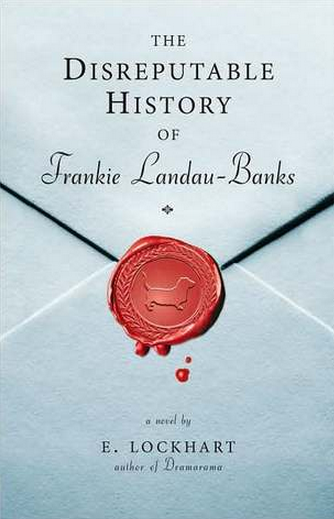The Disreputable History of Frankie Landau-Banks: “The Bunny Rabbit is Dead”

The Disreputable History of Frankie Landau-Banks is first and foremost a story about feminism. Not in that precise wording, perhaps, because that precise wording never once occurs to Frankie. But Frankie is excruciatingly aware of the double standard and actively tries to raise awareness of it—to the ire of her friends, boyfriend, and faculty at her elite boarding school.
Just as Frankie didn’t start out trying to dismantle the patriarchy, The Disreputable History didn’t start out as a story about feminism. It started out as a fun, if not overdone, story about a girl, suddenly made beautiful by powers unknown, and her quest to obtain the hottest—not to mention most popular—boy in school.
But what was supposed to happen after she got the boy? Frankie constantly raises this question as her relationship with Matthew grows deeper and deeper. She’s not ignorant of the trope, and she can’t force herself to be ignorant to others expectations of her, which have only decreased in light of her “transformation.”
As Frankie thinks to herself, “She will not be simple and sweet. She will not be what people tell her she should be.”
This point irks Frankie to no end. She knows she’s beautiful, and recognizes this to be the sole reason that Matthew even noticed her. This in and of itself does not upset her. It some ways it pleases her to no end. What upsets her is that this seems to be the only reason he wishes to date her.
Because the other defining characteristic is that Frankie is smart. She reads — and quotes — P.G. Wodehouse and Dorothy Parker. Most importantly, she sees the misogyny around her and strives to do something about it, instead of ignoring the problem as countless others have done.
So what exactly does Frankie do? She subverted the traditional power structure of her elite boarding school by manipulating the all-boy secret society—titled the Loyal Order of the Basset Hounds—into carrying out her devious plans. The catch? To do this, Frankie has to masquerade as Alpha, the leader of the Royal Order.
From here on out the novel becomes entirely about power — who has it versus who wants it. Alpha is used to having power as the leader of the Royal Order and takes that power for granted. He has always had it and assumed he always would.
Frankie, on the other hand, never had that power. She was never even given the opportunity, first by her parents her refer to her as Bunny Rabbit, little and innocent, and then by her school which inherently favored a more patriarchal power structure. She was placed in a box since birth, “A box for young and pretty girls who were not as bright or powerful as their boyfriends. A box for people who were not forces to be reckoned with.” And Frankie wants to be a force.
Recognizing this allows Frankie to embrace her own intelligence and strength. However, the only resolution to the novel is in Frankie’s personal discoveries. The primary of which is that she has the power to form opinions, to wreck pre-existing establishments, and change the world – one boarding school at a time.
Overall, this book is a must-read due to the sense of empowerment it imbues to the reader, while allowing the reader to relate to Frankie’s conflicting desire to fit in and yet be her own individual person. It is a lesson everyone needs to be taught, and a distinction few understand.









